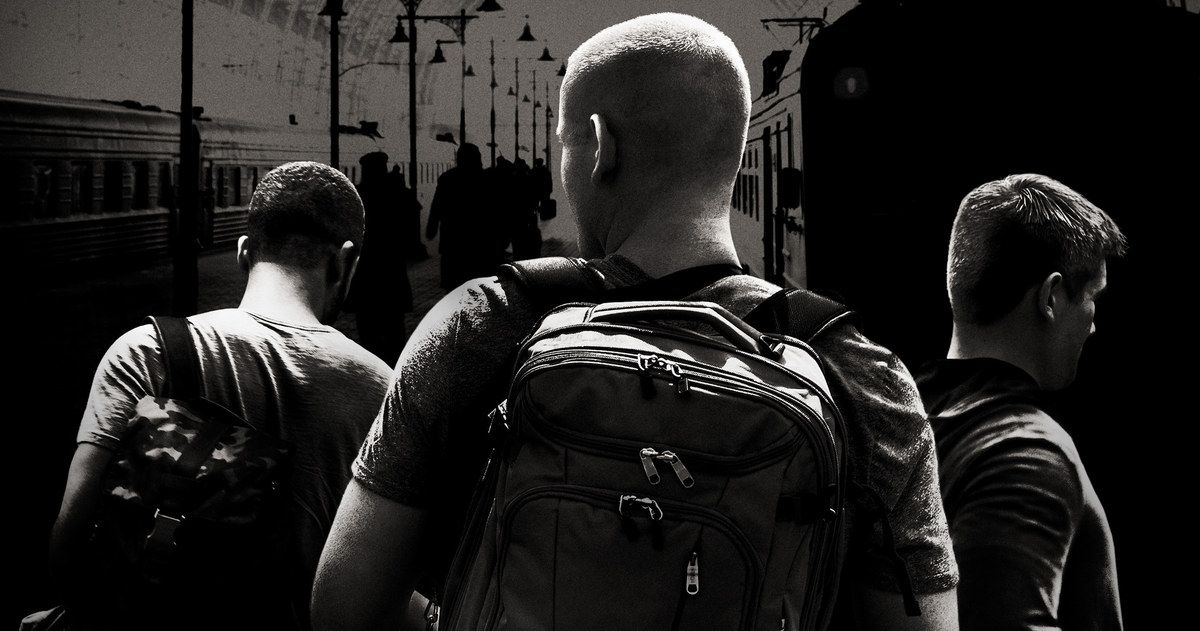Director Clint Eastwood returns with The 15:17 to Paris, a film about heroism portrayed by the actual heroes. Spencer Stone, Alex Skarlatos, and Anthony Sadler grew up together in Sacramento, California. Lifelong best friends, the men went on a European vacation in August of 2015. On the Thalys train from Amsterdam to Paris, they thwarted a terrorist attack that could have killed hundreds of people. Stone, Skarlatos, and Sadler were awarded France's Legion of Honor by then President Francois Hollande. Their actions that fateful day were exceptional. Unfortunately, Clint Eastwood's retelling of their story falls woefully flat.
The 15:17 to Paris opens at the train station in Amsterdam, then cuts back in time to their childhoods. We are introduced to Stone and Skarlatos as rambunctious kids. Their divorced, single mothers (Judy Greer, Jenna Fischer), are called to school to deal with their rebellious behavior. The deeply religious women then send the boys to a Christian school, where they meet the cool rebel, Anthony Sadler.
The film then takes the perspective of Spencer Stone. He becomes the lead character. We follow Stone's struggle to fit in and find purpose. A war and gun enthusiast from youth leads him to join the Air Force. Skarlatos also ends up in the military, but for whatever reason, his formative years are not discussed. The same goes for Anthony Sadler. He pops up a few times as Spencer Stone's pal, but his teens and early adulthood are completely glossed over. By the time the men reunite in Europe, we know a lot about Stone, but Sadler and Skarlatos are a mystery.
Eastwood's focus on Stone makes sense to a point. He was the primary foil of the attacker. The script by Dorothy Blyskal, based on the book by Joseph E. Stern, paints Stone as searching for purpose. He believes in helping people, that he was meant for something greater. His Good Samaritan personality, coupled with his Air Force training, was pivotal that day. His skills and personality type enabled him to act when others cowered.
My issue is that the film is so heavy-handed in their early depiction. The first hour of The 15:17 to Paris is painfully slow. The scenes are disjointed and clumsy. There is no narrative thread between events as we jump around in time. Even more confusing is the lack of time spent on Sadler and Skarlatos. By the time they all meet up in Europe, we know they're buddies and Stone is waxing philosophical. What follows next is them being tourists. Eastwood shows they were just regular guys on vacation. It is completely uninteresting. When we finally get to the attack, the film feels like its been meandering forever.
The climactic scene is absolutely riveting. It is both thrilling and terrifying to see in real time. The 15:17 to Paris had been like a stalled car to this point. The engine has been idling for eighty minutes before taking off like a rocket. Eastwood needed to either spread this energy throughout the film, or have a more effective buildup to the attack. A better approach might have been to shoot the train sequence as primary, then the childhood stuff as brief interludes to the terrorist takedown.
Another thought occurred to me after discussing the film with a friend. Spencer Stone is front and center. He's the first guy to engage the terrorist, then use his medical training under extraordinary duress. But it could also be he was the best actor. Maybe Eastwood liked his performance better then the others during editing; and directed more screen time to him. That's a just guess, the finished product can only be judged as presented by Eastwood.
From Warner Bros., The 15:17 to Paris is an incredible story that didn't translate to a good movie. That's a bummer, because what Stone, Skarlatos, and Sadler did was truly amazing. It boggles the mind to think the terrorist had a machine gun, hand gun, and three hundred rounds of ammo. They prevented a massacre on that train. The men may not make it as actors, but deserve every bit of acclaim for their actions. The 15:17 to Paris, despite its flaws, is worth seeing because of their bravery.

